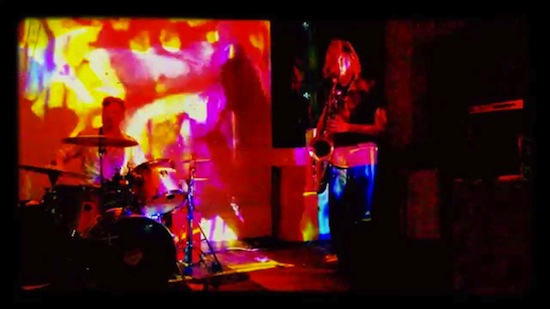Welcome back jazz fiends. Spring’s Complete Communion brings you avant-garde Ellingtonia from Matthew Shipp, fiery free jazz and top notch Sinatra puns from Death Shanties, pianistic brilliance from Alexander Hawkins, and a bass masterclass from Barry Guy. We also discuss a splendid piece of free improv hum and clang from Roger Turner and Otomo Yoshihide, the latest from Seb Rochford’s jazz-groove-electronica outfit Polar Bear, and the debut LP from Sunn O))) and Sun Ra fans Free Nelson ManDoomJazz.
The coming weeks boast a frenzy of live action. Oh, for a Tardis and unlimited funds! March 30 brings the brilliant Portuguese saxophonist Rodrigo Amado and his Motion Trio to London’s Cafe Oto, with special guest Peter Evans on trumpet. This fiery, tender and ingenious group were responsible for two of tQ’s favourite jazz albums of 2014; it’s hugely exciting to have them on these shores.
April sees multi-instrumentalist Daniel Carter return to the UK following his staggering duo show with William Parker at Glasgow’s Arika Episode 4 in 2013. An under-sung hero of free jazz’s loft era, Carter is an inspirational force, his style ranging from soulful and questing alto sax fire to acrobatic piano torrents. He appears at Glasgow’s Counterflows festival between April 2nd and 5th in a duo with Edinburgh electronic artist Owen Green and in a trio with local legend George Lyle on bass and Dada percussionist Fritz Welch. Then on April 6th to 7th, Carter undertakes a short residency at Cafe Oto with guests including John Edwards and Thurston Moore.
A festival of international underground music, Counterflows also features jazz guitarist Raymond Boni’s tribute to Donald Ayler and Evan Parker and Sten Standell’s improvisations for saxophone and church organ). Free jazz hero Joe McPhee was featured artist at Counterflows 2014 and he returns to Cafe Oto on April 16 to play with Dutch-American trio Universal Indians.
The Red Bull Music Academy tour brings the intriguing Cosmic Expansions event to Bristol Planetarium on April 6, starring soul-jazz legend Lonnie Liston Smith and Gilles Peterson featuring Terri Walker and the Cosmic Echoes. Blasting Glasgow duo Death Shanties are on tour throughout April, as are Seb Rochford’s jazz-electronica outfit <a href=""http://www.polarbearmusic.com/shows/" target="out">Polar Bear and beloved Australian improv trio The Necks.
Bobby Wellins and Clark Tracey perform the late British jazz legend Stan Tracey’s Under Milk Wood at the Sage, Gateshead on April 10th and Ronnie Scots, London on April 14th. The latter date also sees the Vortex debut of Orphy Robinson and Cleveland Watkiss’s loft era-inspired improv and groove night Freedom, which will take place at the Dalston venue on the second Tuesday of each month.
Conductor and improviser Ilan Volkov has transformed the orchestral music scene in Scotland by bringing the classical avant-garde and the experimental underground together under the banner of Tectonics. This year’s Glasgow instalment, running from May 1st to 3rd, has a particularly strong jazz and improv element, with Glasgow Improvisers Orchestra and members of the Scottish Symphony Orchestra performing a new work by Mariam Rezaei, and the mighty Peter Brötzmann performing solo and in a hair-raising new duo with Glasgow/Texas pedal steel wrangler Heather Leigh.
Quietus favourite Paal Nilssen Love brings his ten piece Norwegian big band Large Unit to Cafe Oto on May 1st to 2nd. Expect superhuman feats of drumming, rowdy riffs and free noise, alongside more soulful and reflective passages. With her late guitarist husband Sonny, Linda Sharrock cut one of the all-time great free jazz sides in 1969’s Black Woman. Her matinee show at London’s Vortex jazz club on May 3rd is well worth checking out. The great Matthew Shipp, whose latest album is reviewed below, plays Cafe Oto on May 21sr, while the following evening brings a cracking bill of underground free jazz from Italy’s Jookloo Duo and Brighton’s West Hill Blast Quartet to the venue. Finally, May 26 brings a rare chance to see veteran free jazz firebrand Charles Gayle, also at Oto.
Matthew Shipp – To Duke
(Rogue Art)

From William Parker and Mats Gustafsson to Cuong Vu and Alexander Hawkins, there have been several avant-garde takes on the music of Duke Ellington in recent years. Ellington was, after all, avant-garde himself; as the writer Howard Mandel has noted, his Cotton Club music of the late 1920s may have been gloriously melodic and danceable, but it sounded like nothing that had come before (I mean, how weird do the horns at the start of 1931’s ‘Mystery Song’ sound?). Matthew Shipp, perhaps the finest pianist in contemporary free jazz, steps up to the challenge of opening these timeless compositions up to free improvisation, without losing any of that gorgeous melodicism. The piano trio format inevitably invites comparison with Ellington’s classic 1963 session with Charles Mingus and Max Roach, Money Jungle, but while that album had a raw, one-off feel, To Duke is the work of a well-established trio, with Michael Bisio on double bass and Whit Dickey on drums.
An inspired take on Billy Strayhorn’s ‘Take The A Train’ replaces the original’s swing with a nervy energy, as if it’s the soundtrack to some sped-up footage of Grand Central Station in the 1930s. While Ellington conjures a glamorous jaunt to Harlem, Shipp evokes a frantic dash, with passengers scurrying through plumes of steam as train guards yell out their final calls. Shipp chops chromatic scales into increasingly manic morse-code patterns, before pounding out locomotive bass clusters as Bisio makes like a piston lurching into motion with string snaps and thrumming bow-work. Shipp plays ‘Mood Indigo’ almost straight, making elegant flourishes across the keyboard while the rhythm section slip subtly in and out of time. ‘Prelude To A Kiss’ is similarly romantic, with some subtle chromatic shifts in the chorus underlining the beauty of the melody. Shipp’s own compositions elaborate on Ellington signatures: the blues vamps and Cotton Club jungle rhythms of ‘Dickey Duke’, the abstracted Queen’s Suite Satie-isms of ‘Tone Poem For Duke’. A brilliant album that testifies to the inspiration and potential in Ellington’s compositions.
Alexander Hawkins Trio – Alexander Hawkins Trio
(Alexander Hawkins Music)

Oxford-based pianist and composer Alexander Hawkins is another avant-garde Ellingtonian, mapping abstract geometries onto ‘Take The A Train’ on his superb 2013 solo record Song Singular. The connections are deepened on this excellent trio set, features Neil Charles on double bass and Tom Skinner on drums. Hawkins sets out his stall on the opening ‘Sweet Duke’ and reprises ‘Song Singular’ as part of a medley, manifesting the spirit of Ellington in his indigo and violet chord voicings, rather than any explicit quotations. Fragments of Ellington and Strayhorn are reconstituted in a post-Cecil Taylor framework, the abstracted melodies and deconstructed rhythms retaining their humanity and spark. It’s tempting to think of ‘Perhaps 5 Or 6 Different Colours’ as a kind of sonic abstract expressionism, with Hawkins tending towards the clear strokes and bold angles of Franz Kline, rather than the ejaculatory moves of Jackson Pollock.
Hawkins and Skinner have both toured with Ethiopian jazz legend Mulatu Astatke, and that relationship seems to have rubbed off on tunes like ‘AHRA’ and ‘Baobabs + SGrA =’, with their lovely, open harmonies and abstracted Latin rhythms. The latter tune veers off into dissonance and lateral moves, but its main theme is a beauty, illuminating the whole with clear shafts of light. Closing track ‘Blue Notes For A Blue Note (Joy To You)’ pays tribute to his regular collaborator Louis Moholo-Moholo, the sole surviving member of exiled South African jazz band the Blue Notes. Hawkins recently contributed some inspired arrangements to Moholo-Moholo’s Dedication Orchestra, pushing their township and Zulu influenced jazz tunes into free improv territory. He takes a similar approach here, shading a gorgeous, reflective melody with dissonant tones, while Skinner scurries forward, strident and graceful.
Death Shanties – Psychic Rome
(Golden Lab Recordings)
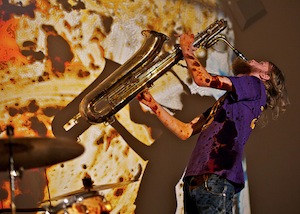
Glasgow-based duo of Yorkshire drummer Alex Neilson and Dutch saxophonist Sybren Renema return with a hot, raw live recording which delivers on their ‘balls to the wall free jazz’ mission statement. Recorded to a single microphone, Psychic Rome is a roaring set, with a psychedelic folk ritual feel in places and some surprisingly tender moments. ‘If All Of Rome Had But One Neck’ roars out of the speakers like a rabid elephant chasing down a herd of rhino. Neilson’s drums alternate between multi-directional frenzy and monomaniacal pounding as Renema brings down the walls. After this initial scrimmage, Neilson drops out, leaving Renema to cast some gnarled tones into the void. The drummer soon leaps back into the fray, culminating in a scene of devastation where Renema punctuates his reed-shredding blats with multiphonic gasps and shrieks. ‘Spoils of Sea’ opens in gritty metallic roars and deconstructed martial rhythms. Renema drops squalling bombs from on high, while Neilson stalks the blasted earth. Pun of the month goes to closing track, ‘Fly Me To Dunoon’. Free jazz goes doon the watter as Renema essays some lyrical improvisations on the Sinatra standard. A more ragged and energetic affair than last year’s crafted studio excursion Crabs, Psychic Rome confirms Death Shanties as one of the British jazz underground’s most exciting acts.
Roger Turner & Otomo Yoshihide – The Last Train
(Fataka)
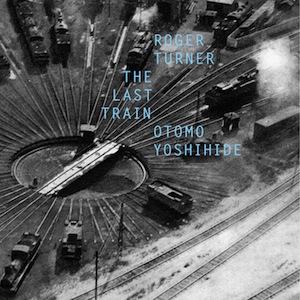
The latest from London free improv label Fataka documents a Cafe Oto communion between British percussionist Roger Turner and Japanese multi-instrumentalist Otomo Yoshihide. ‘The Wait’ begins with a clang of guitar and a lowing feedback drone, Turner’s cymbals adding a splash of colour. Following a brief fretboard and percussive scramble, the duo ease into a quieter, more exploratory mode, with Yoshihide crafting low, resonant bell tones and patiently letting his feedback build, while Turner patters and scrapes. There are passages of near silence, with every faint whistle and percussive shimmer captured beautifully by producer Trevor Brent. Out of this emerge birdsong-like twitters and dial-up modem fizzes, with Turner scurrying like a mouse around a Swiss clock factory. Spontaneous combustion occurs during ‘The Sigh’, with Yoshihide throwing fistfuls of metal into the air. Rather than go all out, however, the duo pull back from the brink, creating a beautiful tension between jagged noise and extra-terrestrial atmospherics. The bells and cymbals of ‘Crack’ suggest a Buddhist ritual, with Yoshihide’s guitar a looming threat that explodes in the final few minutes.
Roger Turner and Otomo Yoshihide – The Last Train
<iframe width="100%" height="450" scrolling="no" frameborder="no" src=" HYPERLINK "https://w.soundcloud.com/player/?url=https%3A//api.soundcloud.com/tracks/186653319&auto_play=false&hide_related=false&show_comments=true&show_user=true&show_reposts=false&visual=true”https://w.soundcloud.com/player/?url=https%3A//api.soundcloud.com/tracks/186653319&auto_play=false&hide_related=false&show_comments=true&show_user=true&show_reposts=false&visual=true">
Barry Guy – Five Fizzles For Samuel Beckett
(No Business)
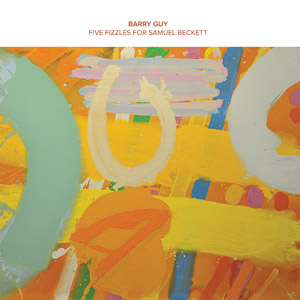
The 12” EP is an under-used format in contemporary jazz, but it’s ideal for solo statements like Barry Guy’s Five Fizzles For Samuel Beckett. In 14 inspired minutes, Guy runs through a plethora of in-the-moment inventions. Each piece is based around a particular idea or instrumental approach: slashing bow work on ‘Fizzle I’, col legno (back of the bow) on ‘Fizzle II;, alternately sensitive and jarring pizzicato on ‘Fizzle IV’, and so on. The results are remarkable, from the keening Easter European melodies and rusty hinge abstractions of ‘Fizzle One’, to ‘Fizzle II’s evocation of a gentle breeze blowing through a cane field. Masterful.
Polar Bear – Same As You
(The Leaf Label)
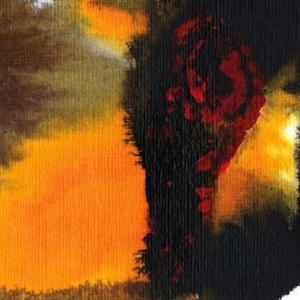
Seb Rochford is a delicious drummer, with a subtly tricksy way with a groove that is infectious. He’s also pretty deft at incorporating electronic post-production into a jazz setting, a case in point being the bashment dub effects and grimy bass pressure he brought to Sons of Kemet’s excellent 2013 debut. His group Polar Bear have long been working at the intersection of contemporary jazz and electronica, with a focus on texture and groove rather than extended improvisation. The results have always been perfectly listenable, but they’ve never been a group to set the pulse racing. A shimmering synth ushers in a spoken word intro from Asar Mikael, owner of Tottenham Jamaican cultural institution The Light Shop, and then we’re into updated trip-hop territory, with cosmic trails of tenor sax from Pete Wareham and Mark Lockheart over a poised drum shuffle. Same As You has a tendency to drift in its first half, and it’s only with the introduction of some electronic drum treatments and tightly coiled altissimo sax squonks that the album gains any urgency. ‘Don’t Let The Feeling Go’ would sit nicely on a Gilles Peterson mix, with Rochford and guest Hannah Darling leading the group in a warm soul-jazz vocal refrain.
Free Nelson ManDoomJazz – Awakening Of A Capital
(RareNoise)
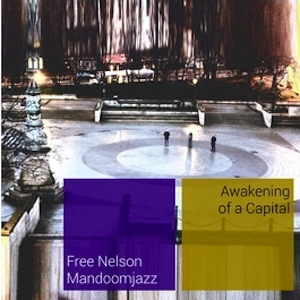
Even with my fondness for corny wordplay, I have to draw the line at that name. A shame, ‘cos the prospect of a free jazz/doom metal fusion is a tantalising one. I, for one, long for the day Mats Gustafsson hooks up with fellow Swedes Candlemass (Epicus Doomicus Jazzicus anyone?). In Rebecca Sneddon this Edinburgh trio have a saxophonist capable of snaky melodies and controlled explosions, but the rhythm section of bassist Colin Stewart and drummer Paul Archibald tend to plod when they should be pushing the music forward with diabolical intent. There are some nice touches – opening track ‘Sunn Ra)))’ sees Stewart forging an unholy union of Black Sabbath’s ‘War Pigs’ and Alice Coltrane’s ‘Journey In Satchidananda’ – but ultimately Awakening of A Capital just isn’t heavy enough, never quite delivering the hair-raising joys of primo skronk or the deep satisfaction of drowning in a glut of molten metal sludge.
<iframe width="100%" height="450" scrolling="no" frameborder="no" src=" HYPERLINK "https://w.soundcloud.com/player/?url=https%3A//api.soundcloud.com/tracks/181770352&auto_play=false&hide_related=false&show_comments=true&show_user=true&show_reposts=false&visual=true”https://w.soundcloud.com/player/?url=https%3A//api.soundcloud.com/tracks/181770352&auto_play=false&hide_related=false&show_comments=true&show_user=true&show_reposts=false&visual=true">

